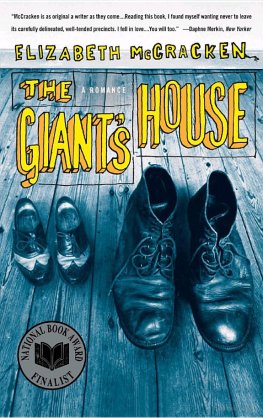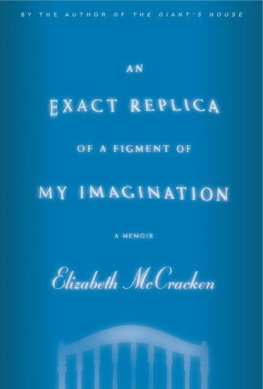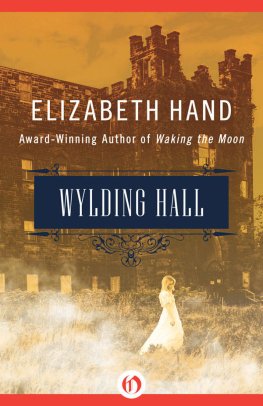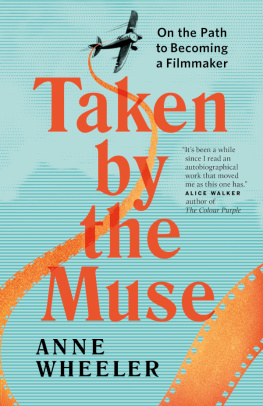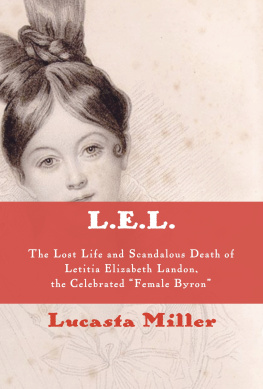Elizabeth McCracken
Thunderstruck & Other Stories
For Edward
for every reason
Just west of Boston, just north of the turnpike, the ghost of Missy Goodby sleeps curled up against the cyclone fence at the dead end of Winter Terrace, dressed in a pair of ectoplasmic dungarees. That thumping noise is Missy bopping a plastic Halloween pumpkin on one knee; that flash of light in the corner of a dark porch is the moon off the glasses she wore to correct her lazy eye. Late at night when you walk your dog and feel suddenly cold, and then unsure of yourself, and then loathed by the world, thats Missy Goodby, too, hissing as she had when she was alive and six years old, I hate you, you stink, you smell, you baby.
The neighborhood kids remember Missy. She bit when she was angry and pinched no matter what. They dont feel sorry for her ghost self. They remember the funeral they were forced to attend after she died, how her mother threw herself on the coffin, wailing, how they thought she was kidding and so laughed out loud and got shushed. The way the neighborhood kids tell the story, the coffin was lowered into the ground and Missy Goodbys grieving mother leapt down and then had to be yanked from the hole like a weed. Everyone always believes the better story eventually. Really, Joyce Goodby just thumped the coffin at the graveside service. Spanked it: two little spanks, nothing serious. She knew that pleading would never budge her daughter, not because she was dead but because she was stubborn. All her life, the more you pleaded with Missy, the more likely she was to do something to terrify you. Joyce Goodby spanked the coffin and walked away and listened for footsteps behind her. She walked all the way home, where she took off her shoes, black pumps with worn stones of gray along the toes. Done with you, she told them.
The soul is liquid, and slow to evaporate. The bodys a bucket and liable to slosh. Grieving, haunted, heartbroken, obsessed: your friends will tell you to cheer up. What they really mean is dry up. But it isnt a matter of will. Only time and light will do the job.
Who wants to, anyhow?
Best keep in the dark and nurse the damp. Cover the mirrors, keep the radio switched off. Avoid the newspaper, the television, the whole outdoors, anywhere little girls congregate, though the world is manufacturing them hand over fist, though there are now, it seems, more little girls living in the world than any other variety of human being. Or middle-aged men whose pants dont fit, or infant boys, or young women with wide, sympathetic, fretful foreheads. Whatever you have lost there are more of, just not yours. Sneeze. Itch. Gasp for breath. Seal the windows. Replace the sheets, then the mattresses. Pry the mercury from your teeth. Buy appliances to scrub the air.
Even so, the smell of the detergent from the sheets will fall into your nose. The chili your nice son cooks will visit you in the bedroom. The sweat from his clothes when he runs home from high school, the fog of his big yawping shoes, the awful smell of batteries loaded into a remote control, car exhaust, the plastic bristles on your toothbrush, the salt-air smell of baking soda once you give up toothpaste. Make your house as safe and airtight as possible. Filter the air, boil the water: the rashes stay, the wheezing gets worse.
What you are allergic to can walk through walls.
The neighborhood kids dont remember what Joyce Goodby looked like back when she regularly drove down Winter Terrace; theyve forgotten her curly black hair, her star-and-moon earrings, her velvet leggings. Its been five years. Now that shes locked away, they know everything about her. She no longer cuts or colors her mercury hair but instead twists it like a towel and pins it to her head. The paper face mask she wears over her nose and mouth makes her eyes look big. Her clothes are unbleached cotton and hemp; an invalid could eat them. She and her son, Gerry, used to look alike, a pair of freckled hearty people. Not anymore. Her freckles have starved from lack of light. Her eyebrows are thick, her eyelashes thin. She seems made of soap and steel wool.
Somethings wrong in the neighborhood, she tells her son, it gave Missy lymphoma and now its made her sick.
Of course shes a witch. The older kids tell younger kids, and kids who live on the street tell the kids round the corner. The Winter Terrace Witch, they call her, as though shes a seventeenth-century legend. She eats children. She kills them. She killed her own daughter a million years ago.
Some gangly kid not even from the street tells Santos and Johnny Mackers about the witch and the ghost. The Mackerses have just moved to Winter Terrace. Santos is nine years old, with curly hair and a strange accent, the result of nearly a decade of post-nasal drip. Johnny is as tough a five-year-old as ever was, a preschool monster Santos has created on the sly. Santos steals their fathers Kools and lights them for Johnny. He has taught Johnny all the swears he knows, taught him how to punch, all in hopes that their mother will love Johnny a little less and him a little more. Its not working. Already theyre famous on the street, where no one has ever seen Johnny Mackerss feet touch the ground. He rides his Big Wheel everywhere: up and down the street and into the attached garage. He rides it directly into the cyclone fence.
Youre a crazy motherfucker, Santos says. A crazy motherfucker. He doesnt like the word himself but Johnny wont learn it otherwise.
Thats Ghostland, by the fence, the gangly kid says, from the other side. Thats where all the ghosts get caught, thats why they call it a dead end.
Nosir, says Santos.
Yessir, says the kid. Dead girl ghost. Plus theres a witch. He spits to be tough but he hasnt practiced enough: he just drools, then walks away, embarrassed.
Johnny Mackers is swarthy and black-haired and Italian-looking, like his mother; Santos has his Irish fathers looks. He likes to shut Johnny into things. Already hes investigated the locks of their new house. The attic, the basement, the mirror-fronted closet in their parents room: every lock sounds different, key, slide bolt, knob, hook-and-eye, dead bolt. Hes glad to learn of a ghost to threaten Johnny with. The dead girl wants to kiss you. Here she comes. Pucker up. But the dead girl isnt interested, and Johnny Mackers knows it. The neighborhood kids are lying when they say they see her. The dead girl doesnt watch as Santos stuffs Johnny into the front hall closet. The dead girl doesnt see the fingers at the bottom of the door, or the foot that stomps on them. She doesnt see Mrs. Mackers open up the door an hour later, saying, What are you doing in there, for Petes sake? The way you hide, it drives me nuts. Why dont you go ride your bike. Go on, now. The dead girl doesnt sleep outside, ever. Why would she? She is with her mother, who as she cleans the kitchen (her eyesight so vigilant she can see individual motes of dust, a single bacterium scuttling along the countertop) can hear the mortar-and-pestle sound of a plastic wheel grinding along the grit of the gutter, a noise that should surely mean more than a grimy black-haired boy getting from one end of the street to another.
A different child might have turned into a different kind of ghost, visible only to little children, a finder of lost balls, a demander of candy. She could have visited Johnny Mackers late at night, when he plotted how he would kill his brother Santos. She could have haunted Santos himself. She could have accomplished things.
Instead, she likes to snuffle close to her mothers skin. The best spot is Joyces skin in the hollow just below her cheekbones and just above her jaw: you have to get close, you have to get nearly under Joyces nose to settle in. Sometimes Missy gets in the way and cuts off her mothers breath. She doesnt mean to. The biting, pinching child bites and pinches, along her mothers arms, her pale stomach.


